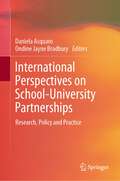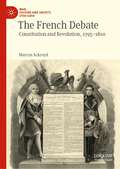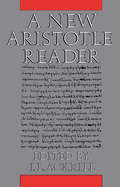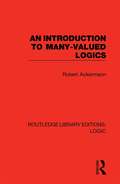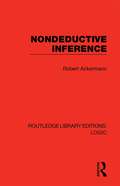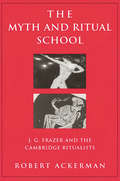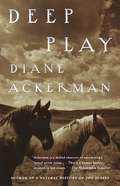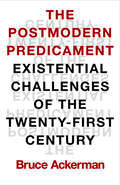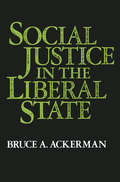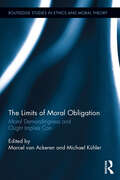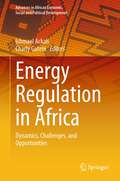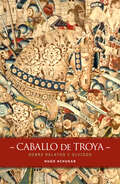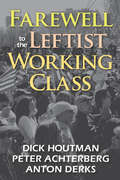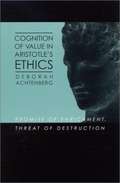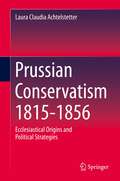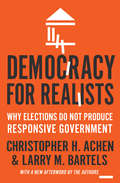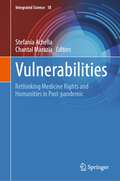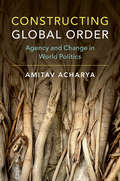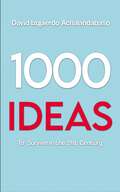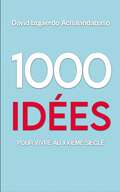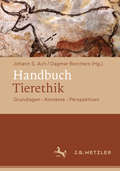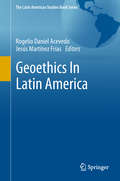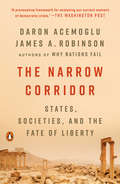- Table View
- List View
International Perspectives on School-University Partnerships: Research, Policy and Practice
by Daniela Acquaro Ondine Jayne BradburyThis book draws together international scholarship on school–university partnerships challenging thinking about purpose and sustainability as well as the power of collaboration in transcending organisational and contextual boundaries. Moving beyond transactional arrangements, the book showcase various models of school–university partnerships, and explores the role of policy, research, and practice, across the life cycle of partnerships. This edited collection presents a strong body of evidence with global significance, providing valuable insights into catalysts for partnerships, the drivers for transformational change, and generative growth resulting from authentic collaboration. An important reference for all teacher education providers, schools, and educational stakeholders, this book showcases global examples of the power of partnerships in an era necessitating cross sectoral collaboration to address contemporary societal challenges.
The French Debate: Constitution and Revolution, 1795–1800 (War, Culture and Society, 1750 –1850)
by Marcus AckroydThis book explores the creation and career of the French Constitution of 1795, operative from the start of the Directory until Napoleon’s takeover in 1799. It explores the composition, history and replacement of the French Revolution’s third Constitution through a focus on the speeches and writings of four sets of political voices discernible in late 1790s France. The four main chapters present these voices as Thermidorians, Conservatives, Republicans and Brumairiens. They reveal the intensity and breadth of the debates generated by the permanent tension between the Constitution and the many ongoing conflicts of the Revolution. Set within and beyond the government and the two legislative chambers, the debates feature numerous conflicts central to the French Revolution including the composition and functions of the public powers, the legitimacy of exceptional laws, the regulation of the press and freedom of religion. This sustained focus on the relationship between the political nation and the Constitution provides a fresh reading of the political culture of the Directory.
A New Aristotle Reader
by J. L. AckrillIn a single volume that will be of service to philosophy students of all levels and to their teachers, this reader provides modern, accurate translations of the texts necessary for a careful study of most aspects of Aristotle's philosophy. In selecting the texts Professor J. L. Ackrill has drawn on his broad experience of teaching graduate classes, and his choice reflects issues of current philosophical interest as well as the perennial themes. Only recent translations which achieve a high level of accuracy have been chosen; the aim is to place the Greekless reader, as nearly as possible, in the position of a reader of Greek. As an aid to study, Professor Ackrill supplies a valuable guide to the key topics covered. The guide gives references to the works or passages contained in the reader, and indication of their interrelations, and current bibliography.
An Introduction to Many-valued Logics (Routledge Library Editions: Logic)
by Robert AckermannOriginally published in 1967. An introduction to the literature of nonstandard logic, in particular to those nonstandard logics known as many-valued logics. Part I expounds and discusses implicational calculi, modal logics and many-valued logics and their associated calculi. Part II considers the detailed development of various many-valued calculi, and some of the important metathereoms which have been proved for them. Applications of the calculi to problems in the philosophy are also surveyed. This work combines criticism with exposition to form a comprehensive but concise survey of the field.
Nondeductive Inference (Routledge Library Editions: Logic)
by Robert AckermannOriginally published in 1966. An introduction to current studies of kinds of inference in which validity cannot be determined by ordinary deductive models. In particular, inductive inference, predictive inference, statistical inference, and decision making are examined in some detail. The last chapter discusses the relationship of these forms of inference to philosophical notions of rationality. Special features of the monograph include a discussion of the legitimacy of various criteria for successful predictive inference, the development of an intuitive model which exhibits the difficulties of choosing probability measures over infinite sets, and a comparison of rival views on the foundations of probability in terms of the amount of information which the members of these schools believe suitable for fruitful formalization. The bibliographies include articles by statisticians accessible to students of symbolic logic.
Deutschland und Europa im Umbruch: Einstellungen, Verhalten und Forschungsperspektiven im Kontext der Bundestagswahl 2017 und der Europawahl 2019 (Wahlen und politische Einstellungen)
by Kathrin Ackermann Heiko Giebler Martin ElffUmbrüche und Krisen führen zu drastischen Veränderungen und bedingen Wandel – nicht zuletzt mit Blick auf politische Einstellungen und politisches Verhalten sowie den politischen Wettbewerb. Mit einem Schwerpunkt auf die Bundestagswahl 2017 und die Europawahl 2019 analysieren die Beiträge in diesem Band das Wahlverhalten in Deutschland und Europa vor dem Hintergrund dieser politischen und gesellschaftlichen Veränderungen.
The Myth and Ritual School: J.G. Frazer and the Cambridge Ritualists (Theorists of Myth)
by Robert AckermanFirst Published in 2002. Routledge is an imprint of Taylor & Francis, an informa company.
Deep Play
by Diane AckermanWith A Natural History of the Senses, Diane Ackerman let her free-ranging intellect loose on the natural world. Now in Deep Play she tackles the realm of creativity, by exploring one of the most essential aspects of our characters: the ability to play. "Deep Play" is that more intensified form of play that puts us in a rapturous mood and awakens the most creative, sentient, and joyful aspects of our inner selves. As Ackerman ranges over a panoply of artistic, spiritual, and athletic activities, from spiritual rapture through extreme sports, we gain a greater sense of what it means to be "in the moment" and totally, transcendentally human. Keenly perceived and written with poetic exuberance, Deep Play enlightens us by revealing the manifold ways we can enhance our lives.From the Trade Paperback edition.
The Postmodern Predicament: Existential Challenges of the Twenty-First Century
by Bruce AckermanOne of our most influential political theorists offers a boundary-breaking—and liberating—perspective on the meaning of life in the internet age Human beings have taken one thing for granted since our earliest days: we are bodily creatures dealing with one another on a face-to-face basis. The internet has shattered this fundamental feature of human existence. We are suddenly living our lives in two worlds at once—shifting endlessly from virtual to physical reality as we reach out to others. Worse yet, we are developing different personal identities in our two worlds. We say and do things in virtual reality that flatly contradict our face-to-face commitments to family, friends, and fellow-workers—and vice versa. The Postmodern Predicament explores these dilemmas at each phase of the life cycle, beginning at the moment a young child picks up a cell phone. The existentialist tradition of the twentieth century provides a precious perspective on our postmodern dilemmas. Thinkers and doers like Simone de Beauvoir and Jean-Paul Sartre considered the fragmentation of modern life as a central source of contemporary anxieties. Like them, Ackerman views the challenges of the internet age as a political, no less than personal, problem—and proposes concrete reforms that that could mobilize broad-based support for democracy against demagogic assaults on its very foundations.
Social Justice in the Liberal State
by Bruce AckermanCertain to become the most important work in political theory since John Rawls's A Theory of Justice, this book presents a brilliantly original, compelling vision of a just society-a world in which each of us may live his own life in his own way without denying the same right to others. Full of provocative discussions of issues ranging from education to abortion, it makes fascinating reading for anyone concerned with the future of the liberal democratic state.
The Limits of Moral Obligation: Moral Demandingness and Ought Implies Can (Routledge Studies in Ethics and Moral Theory)
by Marcel Van Ackeren Michael KühlerThis volume responds to the growing interest in finding explanations for why moral claims may lose their validity based on what they ask of their addressees. Two main ideas relate to that question: the moral demandingness objection and the principle "ought implies can." Though both of these ideas can be understood to provide an answer to the same question, they have usually been discussed separately in the philosophical literature. The aim of this collection is to provide a focused and comprehensive discussion of these two ideas and the ways in which they relate to one another, and to take a closer look at the consequences for the limits of moral normativity in general. Chapters engage with contemporary discussions surrounding "ought implies can" as well as current debates on moral demandingness, and argue that applying the moral demandingness objection to the entire range of normative ethical theories also calls for an analysis of its (metaethical) presuppositions. The contributions to this volume are at the leading edge of ethical theory, and have implications for moral theorists, philosophers of action, and those working in metaethics, theoretical ethics and applied ethics.
Energy Regulation in Africa: Dynamics, Challenges, and Opportunities (Advances in African Economic, Social and Political Development)
by Ishmael Ackah Charly GateteThis book analyzes the political economy governing energy regulation across the African continent. Presenting case studies that span diverse energy sectors and countries, it provides an overview of their complex political and regulatory frameworks. The book explores emerging technologies and energy markets, highlighting Africa’s preparedness for the energy transition, and sheds light on the pivotal role of cross-border energy trade with regard to energy access. Further, it examines regulators’ influence within regional power pools, as well as their contribution to gender mainstreaming in the energy sector, addressing vital social issues. This book is divided into five parts, the first of which focuses on the political economy of energy regulation. The second part discusses emerging technologies and climate change issues, while the third examines regional energy markets, and regional institutional collaboration. The fourth part features contributions on gender mainstreaming, while part five rounds up the coverage. The book will be of interest to policymakers and investors in Africa, as well as scholars interested in energy regulation and economics.
Caballo de troya: Sobre relatos y olvidos
by Hugo AchugarUn conjunto de ensayos que defienden el derecho de las voces silenciadas a sobrevivir por encima del relato hegemónico Toda cultura es un campo de batalla. Allí se dirimen cuestiones que trascienden fronteras estéticas, políticas y territoriales. Cualquier decisión en torno a ella está teñida por una distinción ideológica, construye narrativas, hace oír algunas voces y silencia otras.Hugo Achugar no elude el desafío de mirar más allá de lo aparente. Con su particular estilo escritural, que combina el oficio de poeta con la perspectiva del investigador, el docente y el intelectual, invita al lector a un recorrido que cuestiona y desafía. En estos ensayos dialoga, propone y se opone a un relato que se presenta como hegemónico detrás de la aparente pluralidad, toma posición y se compromete con una mirada cultural que incorpore y asimile la diversidad.¿Cómo se establece el relato hegemónico? ¿Con qué criterios se decide la construcción de la memoria? ¿Son las nuevas tecnologías una herramienta para el cambio o llegaron para sostener el status quo? En tiempos de redes, inteligencia artificial y descrédito hacia todo lo humano, este conjunto de ensayos es una invitación a la reflexión y a la búsqueda de posibles horizontes
Farewell to the Leftist Working Class
by Peter AchterbergSocial conflicts and voting patterns in Western nations indicate a gradual erosion of working-class support for the left, a process that class theory itself cannot adequately explain. Farewell to the Leftist Working Class aims to fill this gap by developing, testing, and confirming an alternative explanation of rightist tendencies among the underprivileged. The authors argue that cultural issues revolving around individual liberty and maintenance of social order have become much more significant since World War II.The obligation to work and strict notions of deservingness have become central to the debate about the welfare state. Indeed, although economic egalitarianism is more typically found among the working class, it is only firmly connected to a universalistic and inclusionary progressive political ideology among the middle class.Farewell to the Leftist Working Class reports cutting-edge research into the withering away of working-class support for the left and the welfare state, drawing mostly on survey data collected in Western Europe, the United States, and other Western countries.
Cognition of Value in Aristotle's Ethics: Promise of Enrichment, Threat of Destruction
by Deborah AchtenbergArguing that metaphysics is central to ethics for Aristotle, Achetenberg (philosophy, U. of Nevada, Reno) uses a variety of strategies including textual interpretation as well as broader types of interpretation--elucidation of terms and their meanings in English, examination of a variety of texts from ancient Greek thought, and comparison of Aristotle's views with those of other philosophers and thinkers of different types. Annotation copyrighted by Book News, Inc.
Prussian Conservatism 1815-1856: Ecclesiastical Origins and Political Strategies
by Laura Claudia AchtelstetterThe book examines the nexus between political and religious thought within the Prussian old conservative milieu. It presents early-nineteenth-century Prussian conservatism as a phenomenon connected to a specific generation of young Prussians. The book introduces the ecclesial-political ‘party of the Evangelische Kirchenzeitung’ (EKZ), a religious party within the Prussian state church, as the origins of Prussia’s conservative party post-1848. It traces the roots of the EKZ party back to the experiences of the Napoleonic Wars (1806-15) and the social movements dominant at that time. Additionally, the book analyses this generation’s increasing politicization and presents the German revolution of 1848 and the foundation of Prussia’s first conservative party as the result of a decade-long struggle for a religiously-motivated ideal of church, state, and society. The overall shift from church politics to state politics is key to understanding conservative policy post-1848. Consequently, this book shows how conservatives aimed to maintain Prussia’s character as a Christian and monarchical state, while at the same time adapting to contemporary political and social circumstances. Therefore, the book is a must-read for researchers, scholars, and students of Political Science and History interested in a better understanding of the origins and the evolution of Prussian conservatism, as well as the history of political thought.
Literature, Ethics, and Aesthetics
by Sabrina AchillesA conceptualization of the literary aesthetic for a concern for the Self. Bringing Gilles Deleuze and Felix Guattari's constructivist thinking into a practical domain, Sabrina Achilles rethinks the ways in which literature is understood and taught.
Democracy for Realists: Why Elections Do Not Produce Responsive Government
by Christopher H. Achen Larry M. BartelsDemocracy for Realists assails the romantic folk-theory at the heart of contemporary thinking about democratic politics and government, and offers a provocative alternative view grounded in the actual human nature of democratic citizens.Christopher Achen and Larry Bartels deploy a wealth of social-scientific evidence, including ingenious original analyses of topics ranging from abortion politics and budget deficits to the Great Depression and shark attacks, to show that the familiar ideal of thoughtful citizens steering the ship of state from the voting booth is fundamentally misguided. They demonstrate that voters—even those who are well informed and politically engaged—mostly choose parties and candidates on the basis of social identities and partisan loyalties, not political issues. They also show that voters adjust their policy views and even their perceptions of basic matters of fact to match those loyalties. When parties are roughly evenly matched, elections often turn on irrelevant or misleading considerations such as economic spurts or downturns beyond the incumbents' control; the outcomes are essentially random. Thus, voters do not control the course of public policy, even indirectly.Achen and Bartels argue that democratic theory needs to be founded on identity groups and political parties, not on the preferences of individual voters. Now with new analysis of the 2016 elections, Democracy for Realists provides a powerful challenge to conventional thinking, pointing the way toward a fundamentally different understanding of the realities and potential of democratic government.
Vulnerabilities: Rethinking Medicine Rights and Humanities in Post-pandemic (Integrated Science #18)
by Stefania Achella Chantal MaraziaDrawing from a wide array of disciplinary perspectives and geographical contexts, this volume offers new insights for critically engaging with the problem of vulnerability. The essays here contained take the move from the COVID-19 pandemic, in order to explore the inherent vulnerability of individuals, but also of social, economic and political systems, and probe the descriptive and prescriptive import of the concept.Each chapter provides a self-contained perspective on vulnerability, as well as a specific methodological framework for questioning its meaning. Taken together, the chapters combine into a multi-disciplinary toolkit for approaching the various forms and structures of vulnerability, with a special attention to the intersectional factors shaping the individual experience of it: from gender to age, from disability to mental illness, from hospitalisation to incarceration. The book explores the theoretical richness and complexity of the concept and proposes new analytical approaches to it, before illustrating its multifariousness through empirically grounded case studies. The closing section engages with “the future of vulnerability”, as a hermeneutic, epistemological, and critical-normative perspective to be deployed beyond the domain of global crises and emergencies.The volume is primarily intended as a reference for scholars in the human, social and health sciences. The accessible structure and plain language of the chapters make it also a valuable didactic resource for graduate courses in philosophy, the social sciences and public health.
Constructing Global Order: Agency and Change in World Politics
by Amitav AcharyaFor a long time, international relations scholars have adopted a narrow view of what is global order, who are its makers and managers, and what means they employ to realize their goals. Amitav Acharya argues that the nature and scope of agency in the global order – who creates it and how – needs to be redefined and broadened. Order is built not by material power alone, but also by ideas and norms. While the West designed the post-war order, the non-Western countries were not passive. They contested and redefined Western ideas and norms, and contributed new ones of their own making. This book examines such acts of agency, especially the redefinitions of sovereignty and security, shaping contemporary world politics. With the decline of the Western dominance, ideas and agency from the Rest may make it possible to imagine and build a truly global order.
1000 Ideas to Survive in the 21st Century
by David Izquierdo AchalandabasoThis book intends on inspiring a global movement focused on both the individual and collective wellbeing of all human beings. It looks to help you develop your full potential so that you can then have a positive impact on your environment and the lives of others. From a singular perspective, it will allow you to have a new take on the current problems of humanity. Thinking about them in a way you'd never thought about them before. After reading this book you will see the world through a different lens. We all know everything but we never put it into practice, does this sound like a familiar experience? I offer you some original and easy tools to understand and resolve your daily problems. Starting with basic concepts such as perspective, hyperreality and self-responsibility. We'll analyze the current problems with a complete perspective, observing the past, present and future of topics such as: work, mental health, social networks, environmentalism, feminism, sex, family, money, governments, as well as the ideas and values of this globalized world. A humanistic vision of reality, helping you to value yourself, value others and value how much or how little you have. 1000 reflections to combat the current global pessimism that is unfairly making humans the most undervalued brand in history. Let's make a brand! Shall we do it together?
1000 Idées Pour Vivre Au Xxième Siècle: 1000 idées pratiques pour un monde meilleur
by David Izquierdo AchalandabasoLe présent livre vise à inspirer un mouvement mondial axé sur le bien-être individuel et collectif de tous les êtres humains. Il vous aidera à développer tout votre potentiel afin que vous puissiez avoir un impact positif sur votre environnement et la vie des autres. D'un point de vue unique, il vous permettra de jeter un regard neuf sur les problèmes actuels de l'humanité, comme vous ne l'avez jamais fait auparavant. Après avoir lu ce livre, vous verrez le monde avec des yeux différents. Nous savons tout mais nous ne le mettons pas en pratique, cela vous semble-t-il familier ? Je vous propose des outils originaux et simples pour affronter et résoudre vos problèmes quotidiens. A partir de concepts de base tels que la perspective, l'hyper-réalité et l'auto-responsabilité. Nous analyserons les problèmes actuels dans une perspective globale, en examinant le passé, le présent et l'avenir de questions telles que : le travail, la santé mentale, les réseaux sociaux, l'environnement, le féminisme, le sexe, la famille, l'argent, les gouvernements, ainsi que les idées et les valeurs dans ce monde globalisé. Une vision humaniste de la réalité, qui vous amènera à vous valoriser, à valoriser les autres et à valoriser ce que vous avez ou non. 1000 réflexions pour combattre le pessimisme mondial actuel qui fait injustement de nous, humains, la marque la plus sous-évaluée de l'histoire. Faisons une marque ! Faisons quelque chose ensemble ?
Handbuch Tierethik: Grundlagen – Kontexte – Perspektiven
by Johann S. Ach Dagmar BorchersDas Handbuch führt ein in zentrale Begriffe, Konzeptionen, Themen- und Problemfelder der Tierethik. Neben der Geschichte der Tierethik, relevanten Konzepten und Theorien sowie einer Bandbreite unterschiedlicher Anwendungskontexte findet sich auch eine Darstellung der Tierphilosophie und ihrer wichtigsten Fragestellungen. Das Handbuch will darüber hinaus auch die sich in aktuellen Diskussionen und Kontroversen abzeichnenden Perspektiven der Tierethik umfassend vorstellen. Ziel des Handbuchs ist es, das breite Spektrum inhaltlicher und begrifflicher Aspekte der historischen und gegenwärtigen Tierethik zu reflektieren und einen Einblick in den aktuellen Diskussionsstand zu geben.
Geoethics In Latin America (The Latin American Studies Book Series)
by Rogelio Daniel Acevedo Jesús Martínez FríasThis book studies geoethics in Latin America and offers comprehensive research on geoethics and geoeducation. Its respective chapters explore geoethics in relation to UNESCO geoparks, mining activities in Latin America, natural hazards and risk management. Geoethics is a key discipline in the field of Earth and Planetary Sciences, and not only includes scientific, technological, methodological and social-cultural aspects, but also addresses the need to consider appropriate protocols, scientific integrity issues and a code of good practice when studying the abiotic world.The position of Latin America’s recently created geoethics associations is based on protection of the environment, together with a reassurance that the balance of nature and the rights of human beings to enjoy it will be preserved.
The Narrow Corridor: States, Societies, and the Fate of Liberty
by Daron Acemoglu James A. RobinsonFrom the authors of the international bestseller Why Nations Fail, a crucial new big-picture framework that answers the question of how liberty flourishes in some states but falls to authoritarianism or anarchy in others--and explains how it can continue to thrive despite new threats. In Why Nations Fail, Daron Acemoglu and James A. Robinson argued that countries rise and fall based not on culture, geography, or chance, but on the power of their institutions. In their new book, they build a new theory about liberty and how to achieve it, drawing a wealth of evidence from both current affairs and disparate threads of world history. Liberty is hardly the "natural" order of things. In most places and at most times, the strong have dominated the weak and human freedom has been quashed by force or by customs and norms. Either states have been too weak to protect individuals from these threats, or states have been too strong for people to protect themselves from despotism. Liberty emerges only when a delicate and precarious balance is struck between state and society. There is a Western myth that political liberty is a durable construct, arrived at by a process of "enlightenment." This static view is a fantasy, the authors argue. In reality, the corridor to liberty is narrow and stays open only via a fundamental and incessant struggle between state and society: The authors look to the American Civil Rights Movement, Europe’s early and recent history, the Zapotec civilization circa 500 BCE, and Lagos’s efforts to uproot corruption and institute government accountability to illustrate what it takes to get and stay in the corridor. But they also examine Chinese imperial history, colonialism in the Pacific, India’s caste system, Saudi Arabia’s suffocating cage of norms, and the “Paper Leviathan” of many Latin American and African nations to show how countries can drift away from it, and explain the feedback loops that make liberty harder to achieve. Today we are in the midst of a time of wrenching destabilization. We need liberty more than ever, and yet the corridor to liberty is becoming narrower and more treacherous. The danger on the horizon is not "just" the loss of our political freedom, however grim that is in itself; it is also the disintegration of the prosperity and safety that critically depend on liberty. The opposite of the corridor of liberty is the road to ruin.
